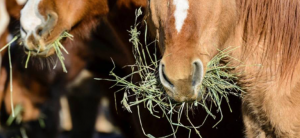 Beware of beetles in Alfalfa Hay for horses! Most horse owners make a visual scan of the hay they feed their horses. Always be on the lookout for mold, wafting dust, unusual plants, and even unidentifiable debris. If feeding alfalfa (lucerne), horse owners should be aware of another potential danger: blister beetles.
Beware of beetles in Alfalfa Hay for horses! Most horse owners make a visual scan of the hay they feed their horses. Always be on the lookout for mold, wafting dust, unusual plants, and even unidentifiable debris. If feeding alfalfa (lucerne), horse owners should be aware of another potential danger: blister beetles.
Blister beetles produce a chemical called cantharidin, a toxin they use as a defense mechanism against predators.
“Horses have an intense reaction to cantharidin, often causing harsh blistering when it comes in contact with sensitive tissues such as those of the gastrointestinal tract, including the mouth,” explained Catherine Whitehouse, M.S., a nutritionist with Kentucky Equine Research (KER). “Based on observations by veterinarians, the intensity of the reaction depends on the amount of cantharidin in every mouthful—the more swallowed, the more severe the reaction.”
Signs associated with cantharidin toxicity, or blister beetle poisoning, include irritation of the oral cavity, including the tongue and mucous membranes, colic, and frequent urination. Cantharidin overload can cause death.
Responsible hay producers, like J&J Hay Farms, understand the dangers of blister beetles and implement procedures to avoid problems.
Prevention:
Firstly, inspecting alfalfa fields for swarms before harvesting. Secondly, timing harvest intervals to steer clear of blooming stages of the plant. Flowers attract beetles.. Lastly, avoiding crushing of hay during harvesting. It pulverizes beetles and releases cantharidin, a stable toxin that stays active even after beetles die.
Often, alfalfa hay is transported long distances. In the case of the United States, sometimes coast to coast. Blister beetles might not be indigenous to the part of the country where horse owners live. However, the hay may nevertheless be contaminated.
“The onus of hay quality ultimately lies with the horse owner, so taking the time to examine hay prior to feeding is prudent,” Whitehouse said. Horse owners may be unable to dodge trouble during the purchase of hay, no matter how selective they are, as beetles like to swarm and often cannot be seen on the outside of bales. This makes inspection prior to feeding essential.
In conclusion, beware of beetles in Alfalfa Hay for horses!
Source: Kentucky Equine Research
